Global Logistics Impact on Operating Costs at ATLAS Logistics: Report
VerifiedAdded on 2023/06/03
|37
|10191
|458
Report
AI Summary
This report investigates the impact of global logistics on the operating costs of ATLAS Logistics, a UK-based trade and freight company. The research delves into the existing literature on logistics management, supply chain efficiency, and transportation models, examining factors affecting logistics performance and freight costs. The report outlines the research methodology, including a deductive approach with a descriptive design, and a thematic analysis of secondary data. Key objectives include understanding the logistics process cycle, exploring logistics models, and evaluating the impact of operating costs. The findings and analysis section presents the themes identified from the data, leading to conclusions and recommendations for ATLAS Logistics to optimize its logistics operations and mitigate operational costs within the context of global supply chains. The report aims to provide insights into how ATLAS Logistics can improve its propositions in the industry, ensuring effective logistics management to foster continued growth.
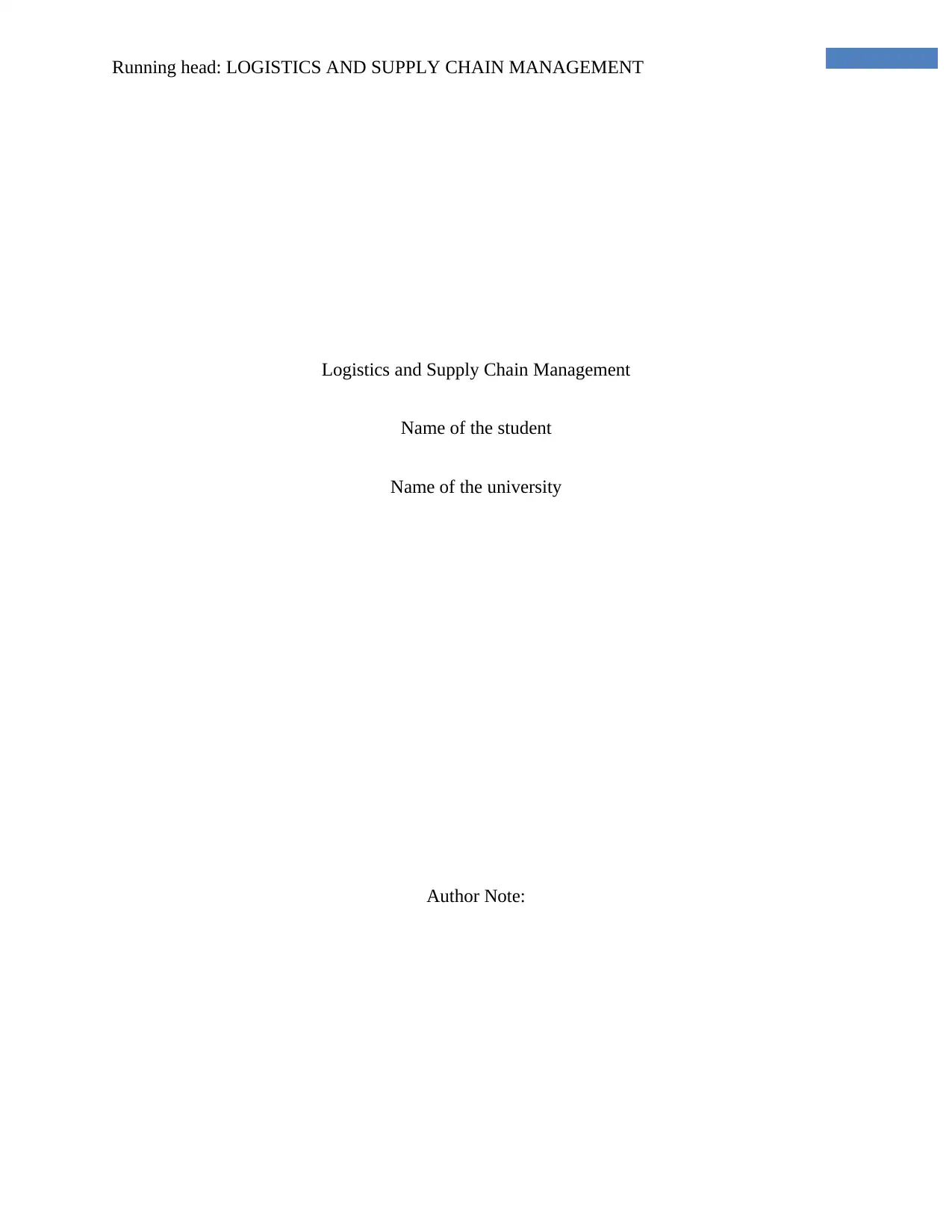
Running head: LOGISTICS AND SUPPLY CHAIN MANAGEMENT
Logistics and Supply Chain Management
Name of the student
Name of the university
Author Note:
Logistics and Supply Chain Management
Name of the student
Name of the university
Author Note:
Paraphrase This Document
Need a fresh take? Get an instant paraphrase of this document with our AI Paraphraser
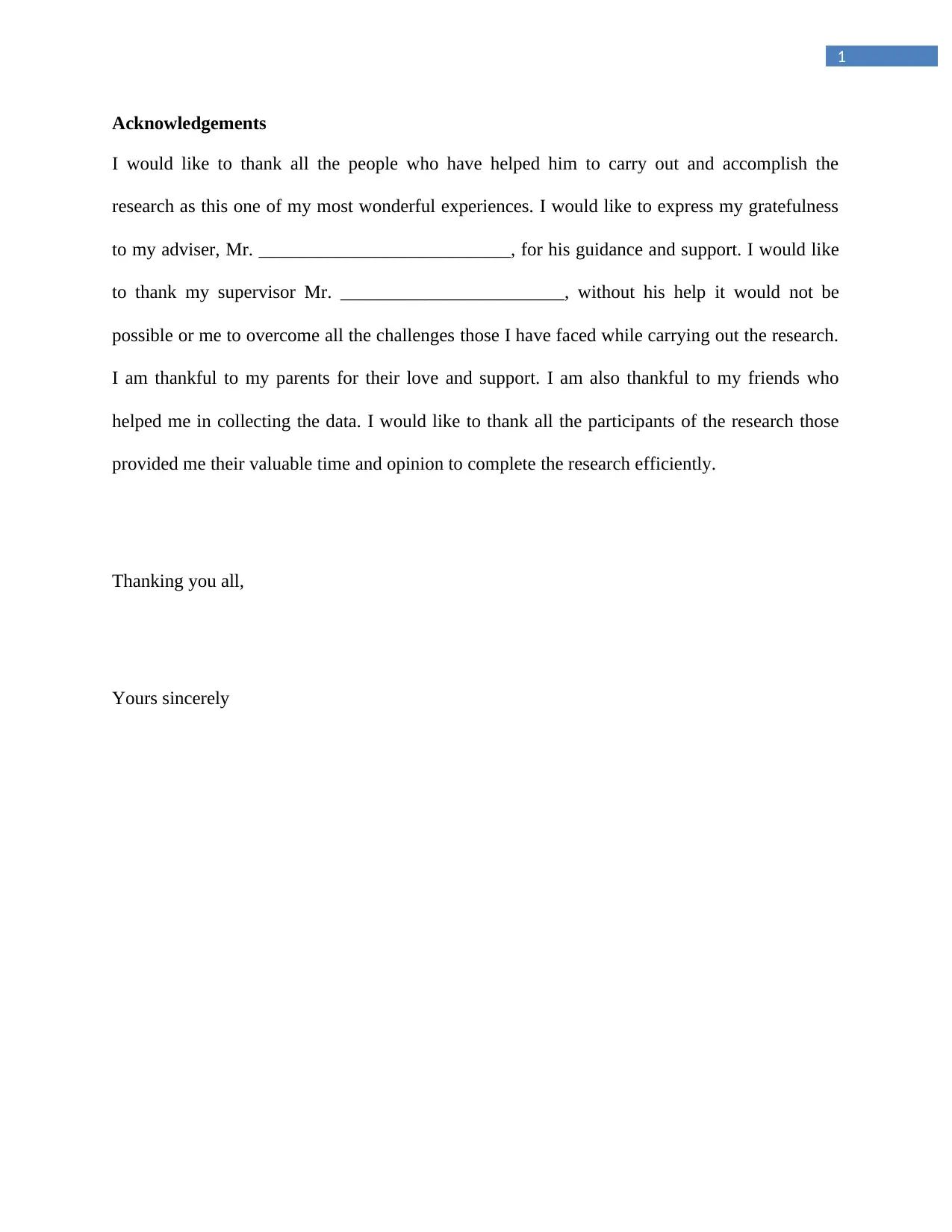
1
Acknowledgements
I would like to thank all the people who have helped him to carry out and accomplish the
research as this one of my most wonderful experiences. I would like to express my gratefulness
to my adviser, Mr. ___________________________, for his guidance and support. I would like
to thank my supervisor Mr. ________________________, without his help it would not be
possible or me to overcome all the challenges those I have faced while carrying out the research.
I am thankful to my parents for their love and support. I am also thankful to my friends who
helped me in collecting the data. I would like to thank all the participants of the research those
provided me their valuable time and opinion to complete the research efficiently.
Thanking you all,
Yours sincerely
Acknowledgements
I would like to thank all the people who have helped him to carry out and accomplish the
research as this one of my most wonderful experiences. I would like to express my gratefulness
to my adviser, Mr. ___________________________, for his guidance and support. I would like
to thank my supervisor Mr. ________________________, without his help it would not be
possible or me to overcome all the challenges those I have faced while carrying out the research.
I am thankful to my parents for their love and support. I am also thankful to my friends who
helped me in collecting the data. I would like to thank all the participants of the research those
provided me their valuable time and opinion to complete the research efficiently.
Thanking you all,
Yours sincerely
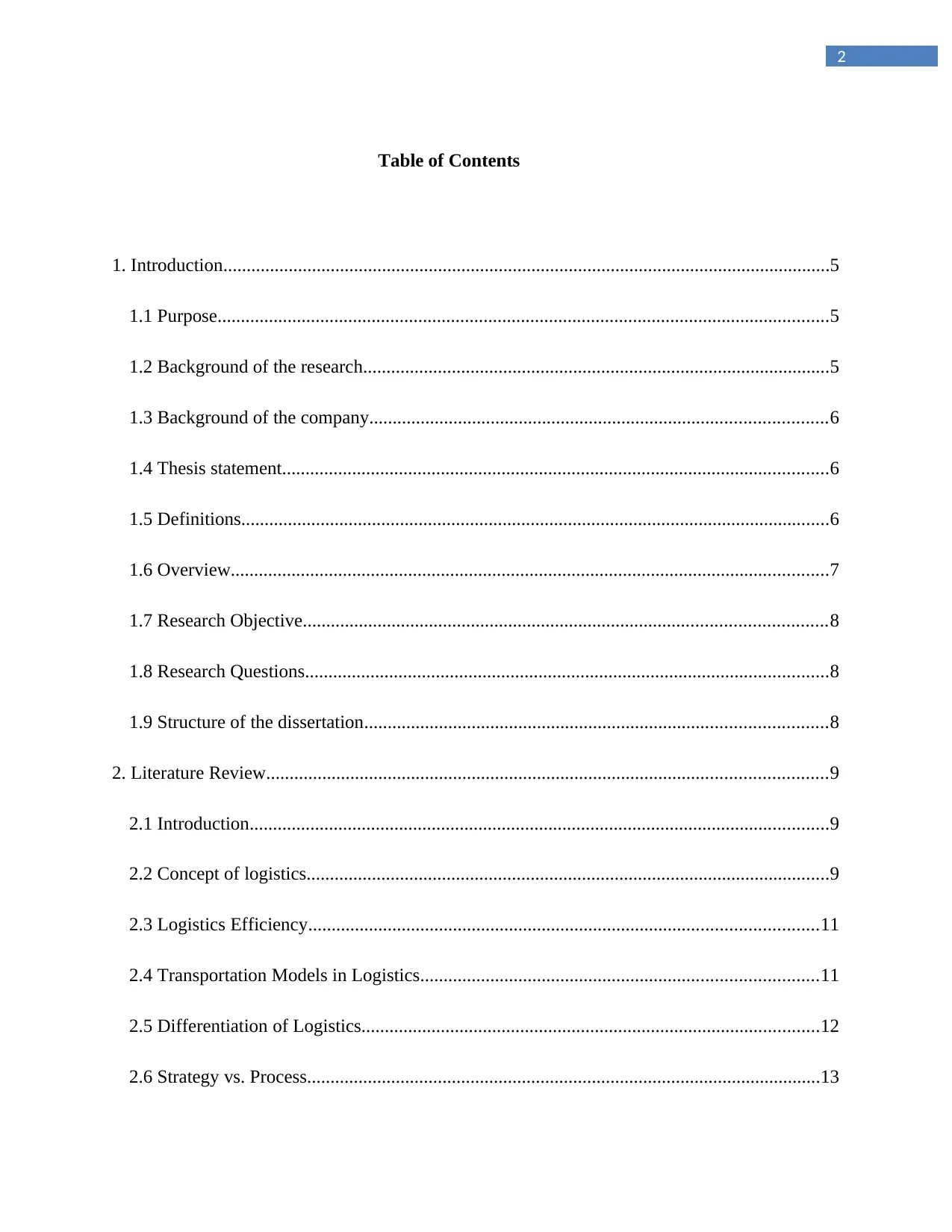
2
Table of Contents
1. Introduction..................................................................................................................................5
1.1 Purpose...................................................................................................................................5
1.2 Background of the research....................................................................................................5
1.3 Background of the company..................................................................................................6
1.4 Thesis statement.....................................................................................................................6
1.5 Definitions..............................................................................................................................6
1.6 Overview................................................................................................................................7
1.7 Research Objective................................................................................................................8
1.8 Research Questions................................................................................................................8
1.9 Structure of the dissertation...................................................................................................8
2. Literature Review........................................................................................................................9
2.1 Introduction............................................................................................................................9
2.2 Concept of logistics................................................................................................................9
2.3 Logistics Efficiency.............................................................................................................11
2.4 Transportation Models in Logistics.....................................................................................11
2.5 Differentiation of Logistics..................................................................................................12
2.6 Strategy vs. Process..............................................................................................................13
Table of Contents
1. Introduction..................................................................................................................................5
1.1 Purpose...................................................................................................................................5
1.2 Background of the research....................................................................................................5
1.3 Background of the company..................................................................................................6
1.4 Thesis statement.....................................................................................................................6
1.5 Definitions..............................................................................................................................6
1.6 Overview................................................................................................................................7
1.7 Research Objective................................................................................................................8
1.8 Research Questions................................................................................................................8
1.9 Structure of the dissertation...................................................................................................8
2. Literature Review........................................................................................................................9
2.1 Introduction............................................................................................................................9
2.2 Concept of logistics................................................................................................................9
2.3 Logistics Efficiency.............................................................................................................11
2.4 Transportation Models in Logistics.....................................................................................11
2.5 Differentiation of Logistics..................................................................................................12
2.6 Strategy vs. Process..............................................................................................................13
⊘ This is a preview!⊘
Do you want full access?
Subscribe today to unlock all pages.

Trusted by 1+ million students worldwide
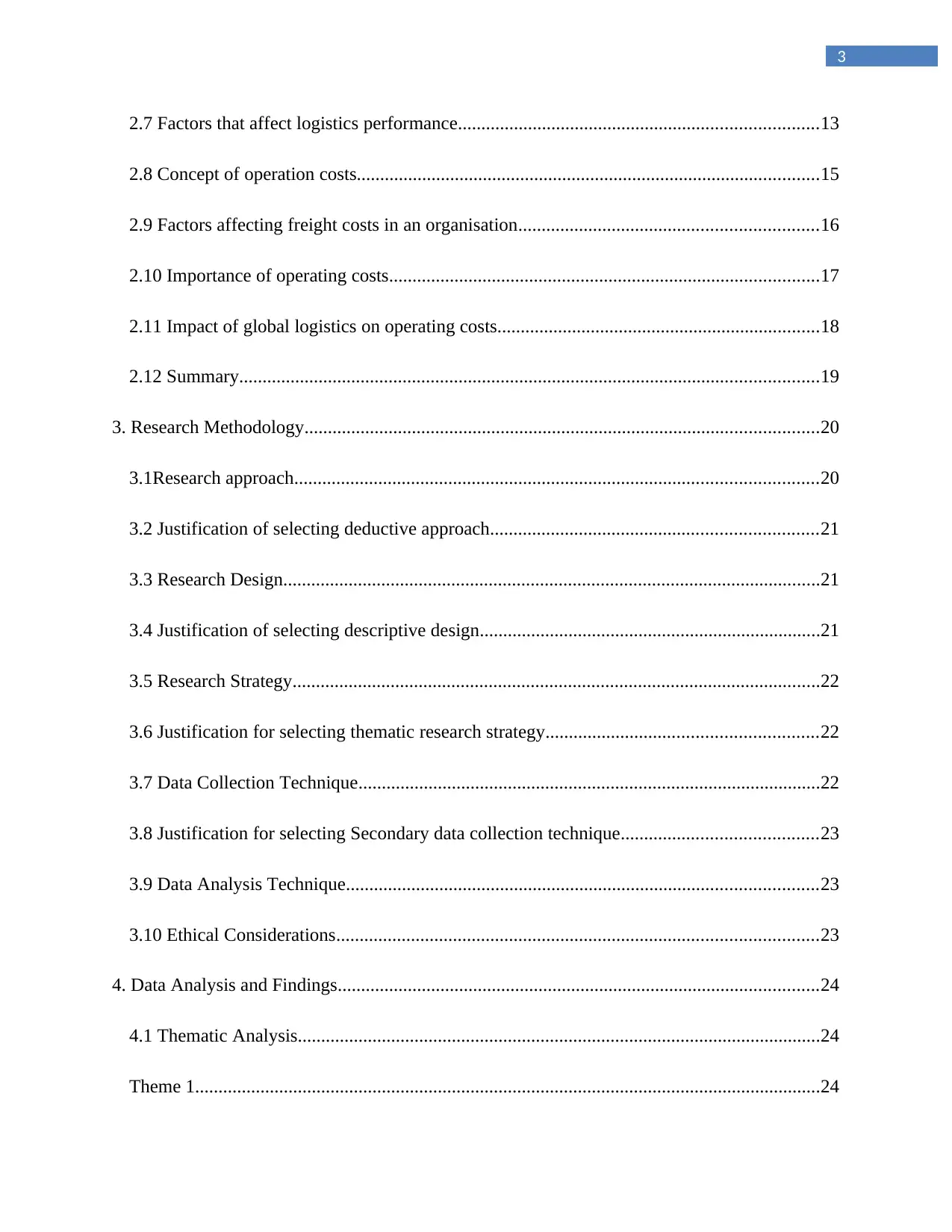
3
2.7 Factors that affect logistics performance.............................................................................13
2.8 Concept of operation costs...................................................................................................15
2.9 Factors affecting freight costs in an organisation................................................................16
2.10 Importance of operating costs............................................................................................17
2.11 Impact of global logistics on operating costs.....................................................................18
2.12 Summary............................................................................................................................19
3. Research Methodology..............................................................................................................20
3.1Research approach................................................................................................................20
3.2 Justification of selecting deductive approach......................................................................21
3.3 Research Design...................................................................................................................21
3.4 Justification of selecting descriptive design.........................................................................21
3.5 Research Strategy.................................................................................................................22
3.6 Justification for selecting thematic research strategy..........................................................22
3.7 Data Collection Technique...................................................................................................22
3.8 Justification for selecting Secondary data collection technique..........................................23
3.9 Data Analysis Technique.....................................................................................................23
3.10 Ethical Considerations.......................................................................................................23
4. Data Analysis and Findings.......................................................................................................24
4.1 Thematic Analysis................................................................................................................24
Theme 1......................................................................................................................................24
2.7 Factors that affect logistics performance.............................................................................13
2.8 Concept of operation costs...................................................................................................15
2.9 Factors affecting freight costs in an organisation................................................................16
2.10 Importance of operating costs............................................................................................17
2.11 Impact of global logistics on operating costs.....................................................................18
2.12 Summary............................................................................................................................19
3. Research Methodology..............................................................................................................20
3.1Research approach................................................................................................................20
3.2 Justification of selecting deductive approach......................................................................21
3.3 Research Design...................................................................................................................21
3.4 Justification of selecting descriptive design.........................................................................21
3.5 Research Strategy.................................................................................................................22
3.6 Justification for selecting thematic research strategy..........................................................22
3.7 Data Collection Technique...................................................................................................22
3.8 Justification for selecting Secondary data collection technique..........................................23
3.9 Data Analysis Technique.....................................................................................................23
3.10 Ethical Considerations.......................................................................................................23
4. Data Analysis and Findings.......................................................................................................24
4.1 Thematic Analysis................................................................................................................24
Theme 1......................................................................................................................................24
Paraphrase This Document
Need a fresh take? Get an instant paraphrase of this document with our AI Paraphraser
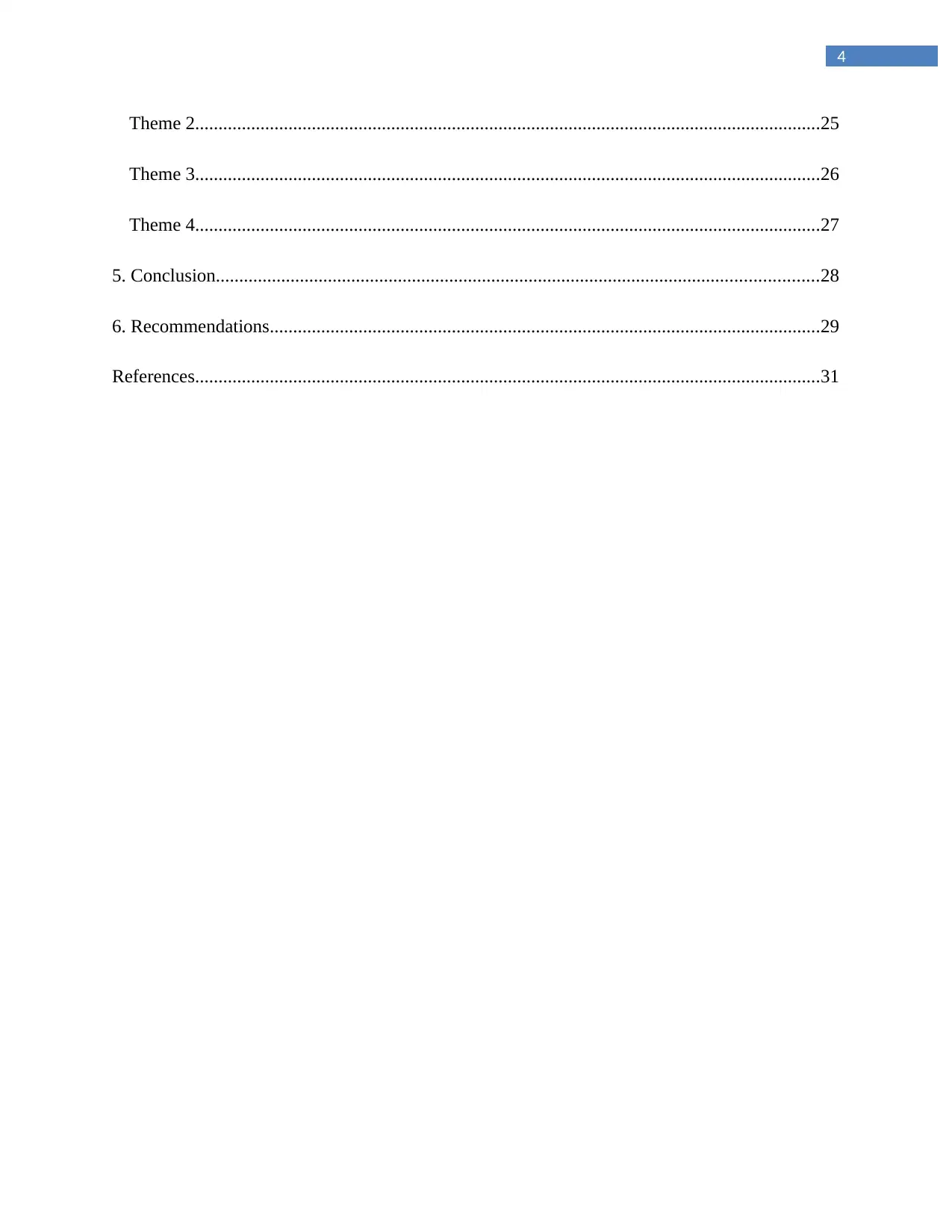
4
Theme 2......................................................................................................................................25
Theme 3......................................................................................................................................26
Theme 4......................................................................................................................................27
5. Conclusion.................................................................................................................................28
6. Recommendations......................................................................................................................29
References......................................................................................................................................31
Theme 2......................................................................................................................................25
Theme 3......................................................................................................................................26
Theme 4......................................................................................................................................27
5. Conclusion.................................................................................................................................28
6. Recommendations......................................................................................................................29
References......................................................................................................................................31
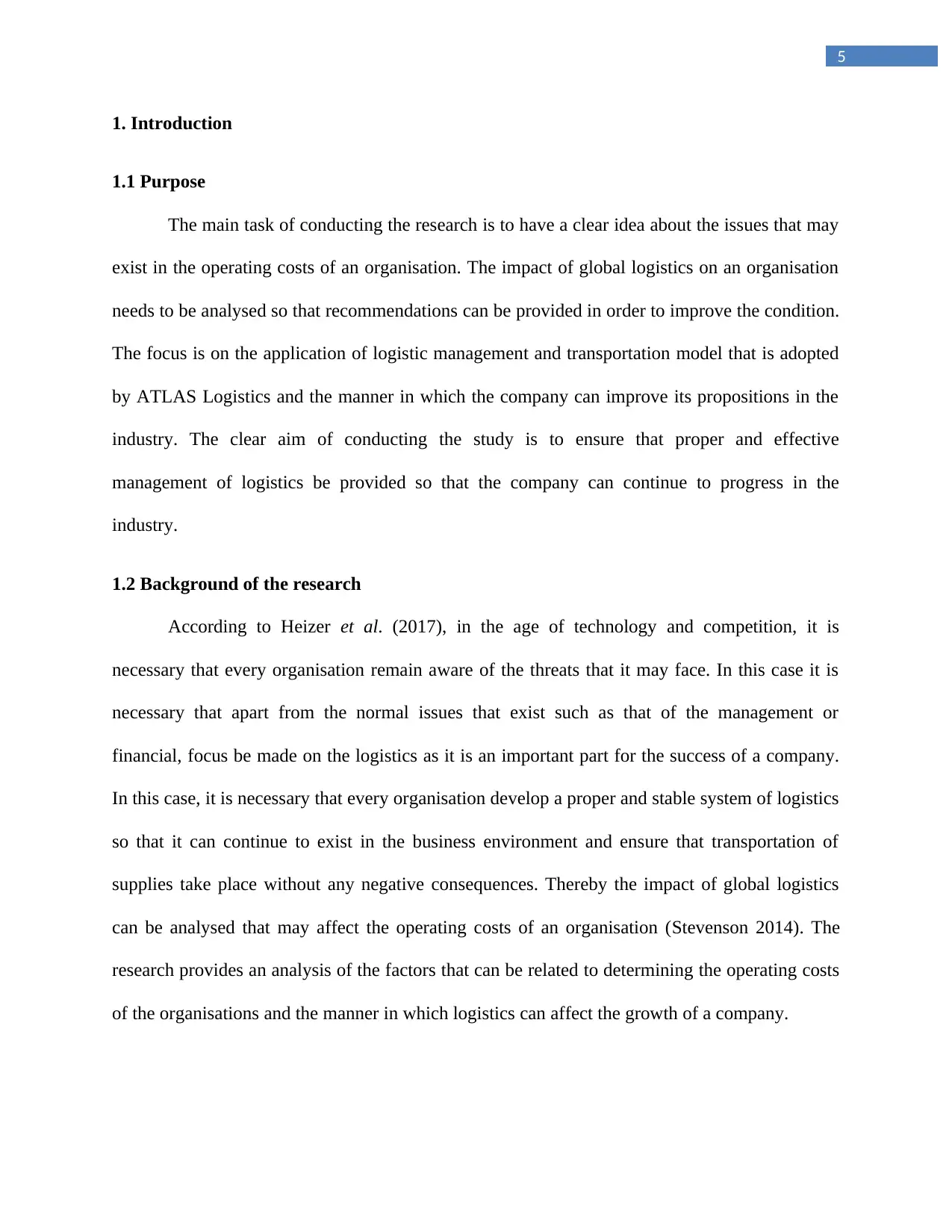
5
1. Introduction
1.1 Purpose
The main task of conducting the research is to have a clear idea about the issues that may
exist in the operating costs of an organisation. The impact of global logistics on an organisation
needs to be analysed so that recommendations can be provided in order to improve the condition.
The focus is on the application of logistic management and transportation model that is adopted
by ATLAS Logistics and the manner in which the company can improve its propositions in the
industry. The clear aim of conducting the study is to ensure that proper and effective
management of logistics be provided so that the company can continue to progress in the
industry.
1.2 Background of the research
According to Heizer et al. (2017), in the age of technology and competition, it is
necessary that every organisation remain aware of the threats that it may face. In this case it is
necessary that apart from the normal issues that exist such as that of the management or
financial, focus be made on the logistics as it is an important part for the success of a company.
In this case, it is necessary that every organisation develop a proper and stable system of logistics
so that it can continue to exist in the business environment and ensure that transportation of
supplies take place without any negative consequences. Thereby the impact of global logistics
can be analysed that may affect the operating costs of an organisation (Stevenson 2014). The
research provides an analysis of the factors that can be related to determining the operating costs
of the organisations and the manner in which logistics can affect the growth of a company.
1. Introduction
1.1 Purpose
The main task of conducting the research is to have a clear idea about the issues that may
exist in the operating costs of an organisation. The impact of global logistics on an organisation
needs to be analysed so that recommendations can be provided in order to improve the condition.
The focus is on the application of logistic management and transportation model that is adopted
by ATLAS Logistics and the manner in which the company can improve its propositions in the
industry. The clear aim of conducting the study is to ensure that proper and effective
management of logistics be provided so that the company can continue to progress in the
industry.
1.2 Background of the research
According to Heizer et al. (2017), in the age of technology and competition, it is
necessary that every organisation remain aware of the threats that it may face. In this case it is
necessary that apart from the normal issues that exist such as that of the management or
financial, focus be made on the logistics as it is an important part for the success of a company.
In this case, it is necessary that every organisation develop a proper and stable system of logistics
so that it can continue to exist in the business environment and ensure that transportation of
supplies take place without any negative consequences. Thereby the impact of global logistics
can be analysed that may affect the operating costs of an organisation (Stevenson 2014). The
research provides an analysis of the factors that can be related to determining the operating costs
of the organisations and the manner in which logistics can affect the growth of a company.
⊘ This is a preview!⊘
Do you want full access?
Subscribe today to unlock all pages.

Trusted by 1+ million students worldwide
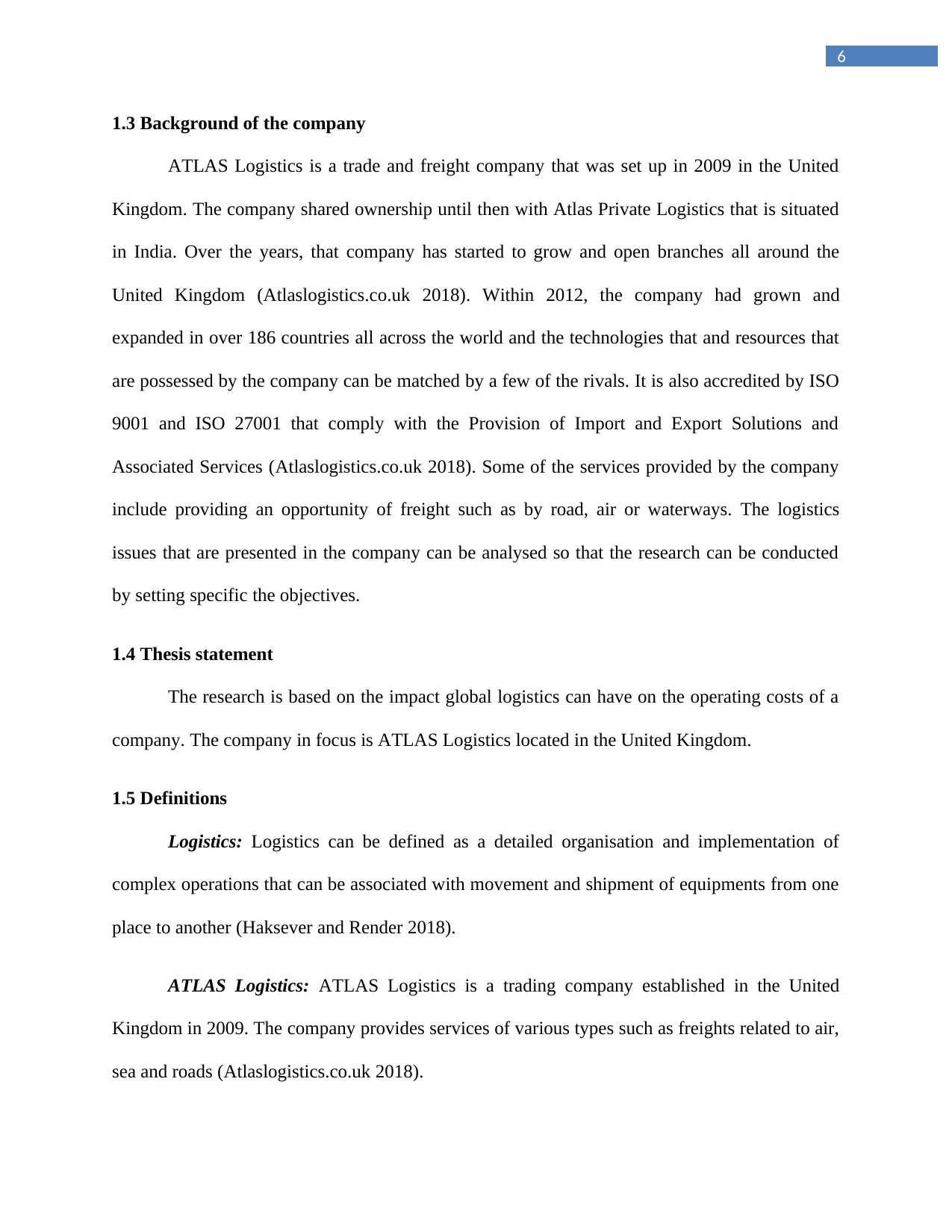
6
1.3 Background of the company
ATLAS Logistics is a trade and freight company that was set up in 2009 in the United
Kingdom. The company shared ownership until then with Atlas Private Logistics that is situated
in India. Over the years, that company has started to grow and open branches all around the
United Kingdom (Atlaslogistics.co.uk 2018). Within 2012, the company had grown and
expanded in over 186 countries all across the world and the technologies that and resources that
are possessed by the company can be matched by a few of the rivals. It is also accredited by ISO
9001 and ISO 27001 that comply with the Provision of Import and Export Solutions and
Associated Services (Atlaslogistics.co.uk 2018). Some of the services provided by the company
include providing an opportunity of freight such as by road, air or waterways. The logistics
issues that are presented in the company can be analysed so that the research can be conducted
by setting specific the objectives.
1.4 Thesis statement
The research is based on the impact global logistics can have on the operating costs of a
company. The company in focus is ATLAS Logistics located in the United Kingdom.
1.5 Definitions
Logistics: Logistics can be defined as a detailed organisation and implementation of
complex operations that can be associated with movement and shipment of equipments from one
place to another (Haksever and Render 2018).
ATLAS Logistics: ATLAS Logistics is a trading company established in the United
Kingdom in 2009. The company provides services of various types such as freights related to air,
sea and roads (Atlaslogistics.co.uk 2018).
1.3 Background of the company
ATLAS Logistics is a trade and freight company that was set up in 2009 in the United
Kingdom. The company shared ownership until then with Atlas Private Logistics that is situated
in India. Over the years, that company has started to grow and open branches all around the
United Kingdom (Atlaslogistics.co.uk 2018). Within 2012, the company had grown and
expanded in over 186 countries all across the world and the technologies that and resources that
are possessed by the company can be matched by a few of the rivals. It is also accredited by ISO
9001 and ISO 27001 that comply with the Provision of Import and Export Solutions and
Associated Services (Atlaslogistics.co.uk 2018). Some of the services provided by the company
include providing an opportunity of freight such as by road, air or waterways. The logistics
issues that are presented in the company can be analysed so that the research can be conducted
by setting specific the objectives.
1.4 Thesis statement
The research is based on the impact global logistics can have on the operating costs of a
company. The company in focus is ATLAS Logistics located in the United Kingdom.
1.5 Definitions
Logistics: Logistics can be defined as a detailed organisation and implementation of
complex operations that can be associated with movement and shipment of equipments from one
place to another (Haksever and Render 2018).
ATLAS Logistics: ATLAS Logistics is a trading company established in the United
Kingdom in 2009. The company provides services of various types such as freights related to air,
sea and roads (Atlaslogistics.co.uk 2018).
Paraphrase This Document
Need a fresh take? Get an instant paraphrase of this document with our AI Paraphraser
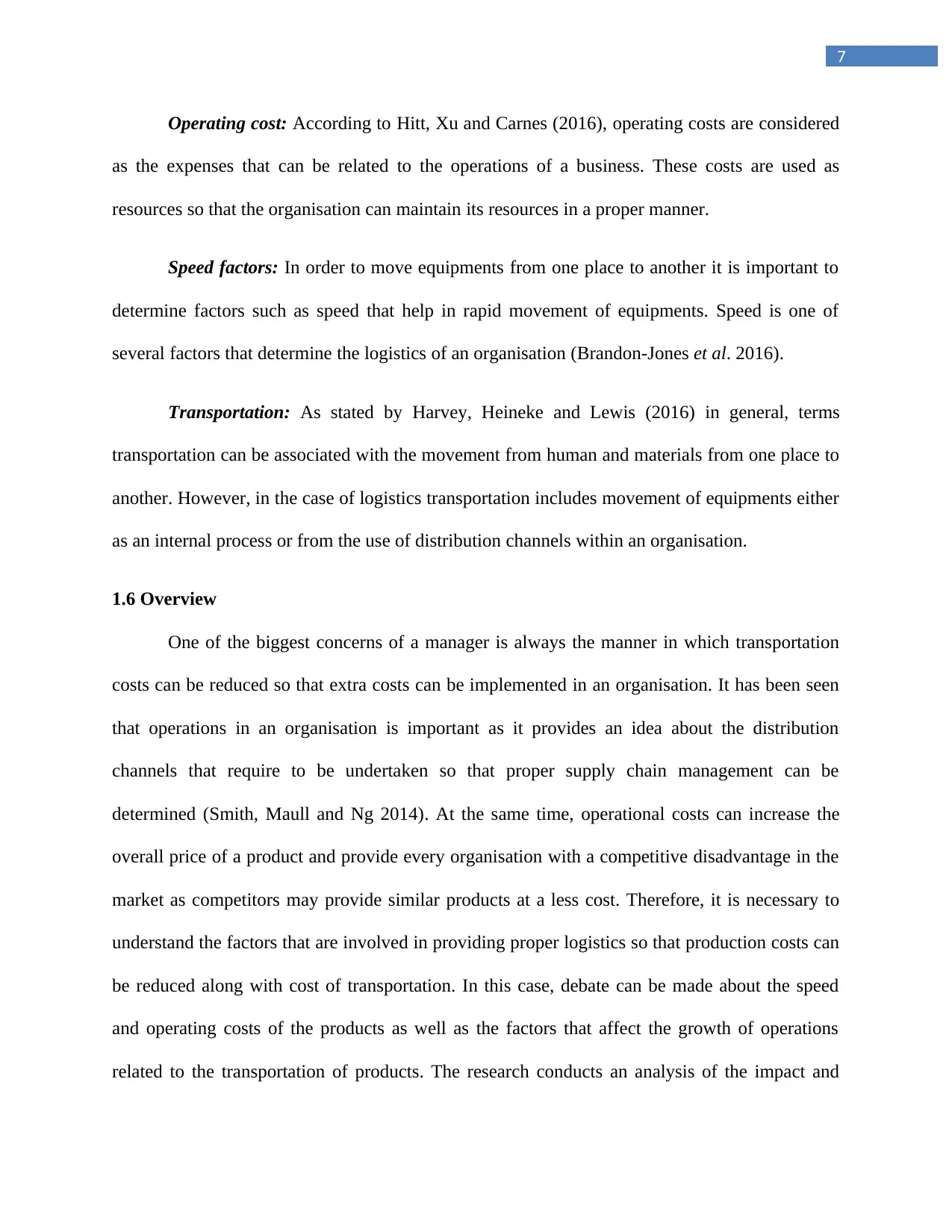
7
Operating cost: According to Hitt, Xu and Carnes (2016), operating costs are considered
as the expenses that can be related to the operations of a business. These costs are used as
resources so that the organisation can maintain its resources in a proper manner.
Speed factors: In order to move equipments from one place to another it is important to
determine factors such as speed that help in rapid movement of equipments. Speed is one of
several factors that determine the logistics of an organisation (Brandon-Jones et al. 2016).
Transportation: As stated by Harvey, Heineke and Lewis (2016) in general, terms
transportation can be associated with the movement from human and materials from one place to
another. However, in the case of logistics transportation includes movement of equipments either
as an internal process or from the use of distribution channels within an organisation.
1.6 Overview
One of the biggest concerns of a manager is always the manner in which transportation
costs can be reduced so that extra costs can be implemented in an organisation. It has been seen
that operations in an organisation is important as it provides an idea about the distribution
channels that require to be undertaken so that proper supply chain management can be
determined (Smith, Maull and Ng 2014). At the same time, operational costs can increase the
overall price of a product and provide every organisation with a competitive disadvantage in the
market as competitors may provide similar products at a less cost. Therefore, it is necessary to
understand the factors that are involved in providing proper logistics so that production costs can
be reduced along with cost of transportation. In this case, debate can be made about the speed
and operating costs of the products as well as the factors that affect the growth of operations
related to the transportation of products. The research conducts an analysis of the impact and
Operating cost: According to Hitt, Xu and Carnes (2016), operating costs are considered
as the expenses that can be related to the operations of a business. These costs are used as
resources so that the organisation can maintain its resources in a proper manner.
Speed factors: In order to move equipments from one place to another it is important to
determine factors such as speed that help in rapid movement of equipments. Speed is one of
several factors that determine the logistics of an organisation (Brandon-Jones et al. 2016).
Transportation: As stated by Harvey, Heineke and Lewis (2016) in general, terms
transportation can be associated with the movement from human and materials from one place to
another. However, in the case of logistics transportation includes movement of equipments either
as an internal process or from the use of distribution channels within an organisation.
1.6 Overview
One of the biggest concerns of a manager is always the manner in which transportation
costs can be reduced so that extra costs can be implemented in an organisation. It has been seen
that operations in an organisation is important as it provides an idea about the distribution
channels that require to be undertaken so that proper supply chain management can be
determined (Smith, Maull and Ng 2014). At the same time, operational costs can increase the
overall price of a product and provide every organisation with a competitive disadvantage in the
market as competitors may provide similar products at a less cost. Therefore, it is necessary to
understand the factors that are involved in providing proper logistics so that production costs can
be reduced along with cost of transportation. In this case, debate can be made about the speed
and operating costs of the products as well as the factors that affect the growth of operations
related to the transportation of products. The research conducts an analysis of the impact and
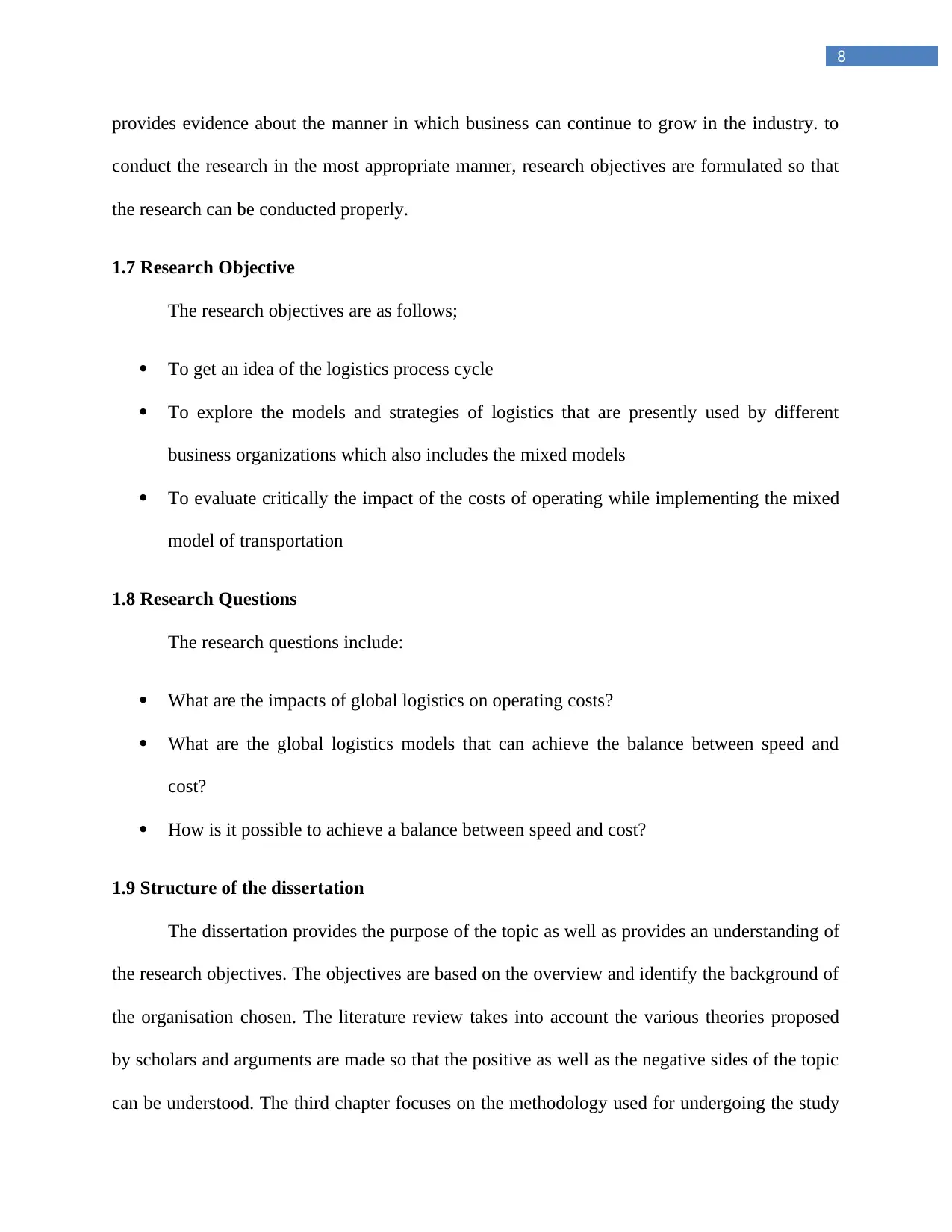
8
provides evidence about the manner in which business can continue to grow in the industry. to
conduct the research in the most appropriate manner, research objectives are formulated so that
the research can be conducted properly.
1.7 Research Objective
The research objectives are as follows;
To get an idea of the logistics process cycle
To explore the models and strategies of logistics that are presently used by different
business organizations which also includes the mixed models
To evaluate critically the impact of the costs of operating while implementing the mixed
model of transportation
1.8 Research Questions
The research questions include:
What are the impacts of global logistics on operating costs?
What are the global logistics models that can achieve the balance between speed and
cost?
How is it possible to achieve a balance between speed and cost?
1.9 Structure of the dissertation
The dissertation provides the purpose of the topic as well as provides an understanding of
the research objectives. The objectives are based on the overview and identify the background of
the organisation chosen. The literature review takes into account the various theories proposed
by scholars and arguments are made so that the positive as well as the negative sides of the topic
can be understood. The third chapter focuses on the methodology used for undergoing the study
provides evidence about the manner in which business can continue to grow in the industry. to
conduct the research in the most appropriate manner, research objectives are formulated so that
the research can be conducted properly.
1.7 Research Objective
The research objectives are as follows;
To get an idea of the logistics process cycle
To explore the models and strategies of logistics that are presently used by different
business organizations which also includes the mixed models
To evaluate critically the impact of the costs of operating while implementing the mixed
model of transportation
1.8 Research Questions
The research questions include:
What are the impacts of global logistics on operating costs?
What are the global logistics models that can achieve the balance between speed and
cost?
How is it possible to achieve a balance between speed and cost?
1.9 Structure of the dissertation
The dissertation provides the purpose of the topic as well as provides an understanding of
the research objectives. The objectives are based on the overview and identify the background of
the organisation chosen. The literature review takes into account the various theories proposed
by scholars and arguments are made so that the positive as well as the negative sides of the topic
can be understood. The third chapter focuses on the methodology used for undergoing the study
⊘ This is a preview!⊘
Do you want full access?
Subscribe today to unlock all pages.

Trusted by 1+ million students worldwide
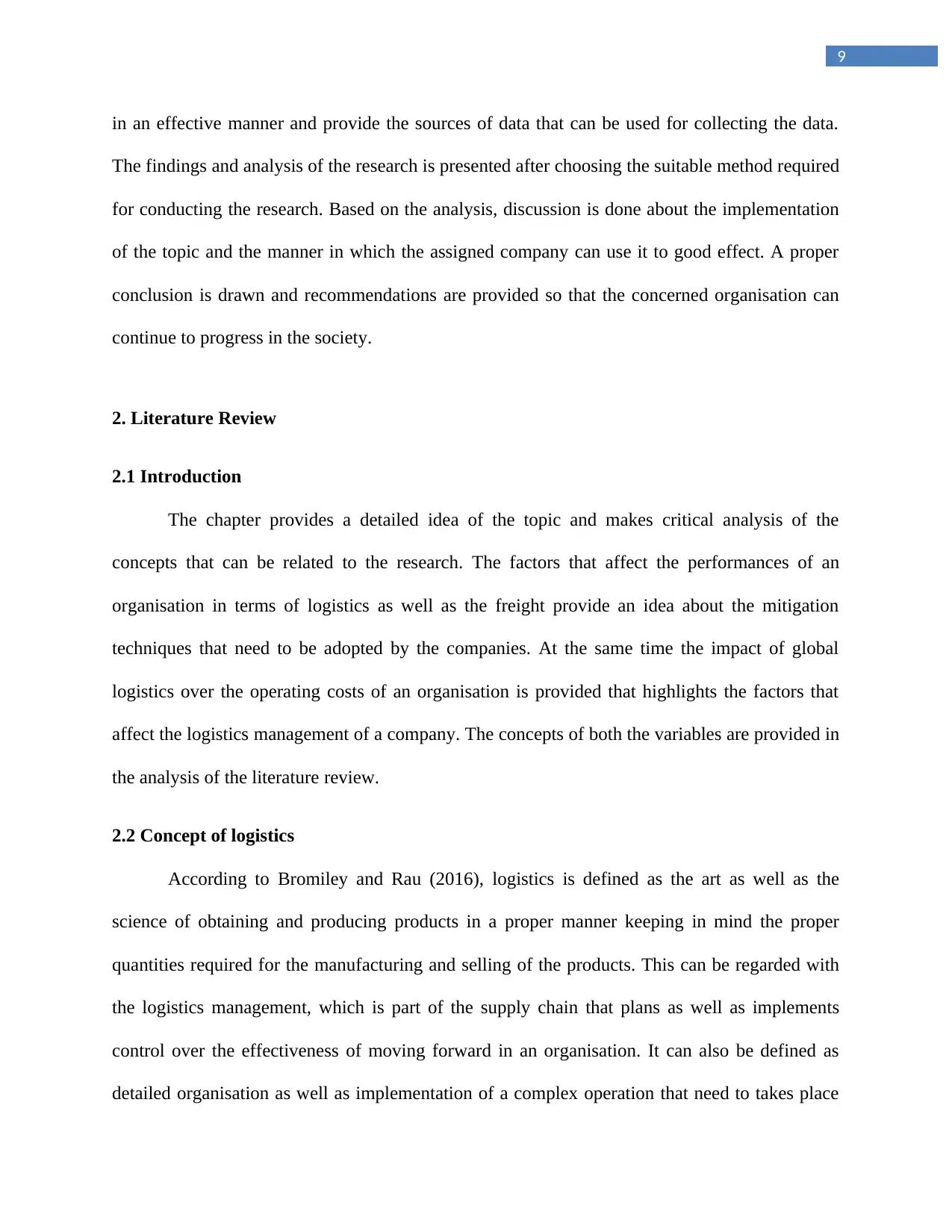
9
in an effective manner and provide the sources of data that can be used for collecting the data.
The findings and analysis of the research is presented after choosing the suitable method required
for conducting the research. Based on the analysis, discussion is done about the implementation
of the topic and the manner in which the assigned company can use it to good effect. A proper
conclusion is drawn and recommendations are provided so that the concerned organisation can
continue to progress in the society.
2. Literature Review
2.1 Introduction
The chapter provides a detailed idea of the topic and makes critical analysis of the
concepts that can be related to the research. The factors that affect the performances of an
organisation in terms of logistics as well as the freight provide an idea about the mitigation
techniques that need to be adopted by the companies. At the same time the impact of global
logistics over the operating costs of an organisation is provided that highlights the factors that
affect the logistics management of a company. The concepts of both the variables are provided in
the analysis of the literature review.
2.2 Concept of logistics
According to Bromiley and Rau (2016), logistics is defined as the art as well as the
science of obtaining and producing products in a proper manner keeping in mind the proper
quantities required for the manufacturing and selling of the products. This can be regarded with
the logistics management, which is part of the supply chain that plans as well as implements
control over the effectiveness of moving forward in an organisation. It can also be defined as
detailed organisation as well as implementation of a complex operation that need to takes place
in an effective manner and provide the sources of data that can be used for collecting the data.
The findings and analysis of the research is presented after choosing the suitable method required
for conducting the research. Based on the analysis, discussion is done about the implementation
of the topic and the manner in which the assigned company can use it to good effect. A proper
conclusion is drawn and recommendations are provided so that the concerned organisation can
continue to progress in the society.
2. Literature Review
2.1 Introduction
The chapter provides a detailed idea of the topic and makes critical analysis of the
concepts that can be related to the research. The factors that affect the performances of an
organisation in terms of logistics as well as the freight provide an idea about the mitigation
techniques that need to be adopted by the companies. At the same time the impact of global
logistics over the operating costs of an organisation is provided that highlights the factors that
affect the logistics management of a company. The concepts of both the variables are provided in
the analysis of the literature review.
2.2 Concept of logistics
According to Bromiley and Rau (2016), logistics is defined as the art as well as the
science of obtaining and producing products in a proper manner keeping in mind the proper
quantities required for the manufacturing and selling of the products. This can be regarded with
the logistics management, which is part of the supply chain that plans as well as implements
control over the effectiveness of moving forward in an organisation. It can also be defined as
detailed organisation as well as implementation of a complex operation that need to takes place
Paraphrase This Document
Need a fresh take? Get an instant paraphrase of this document with our AI Paraphraser
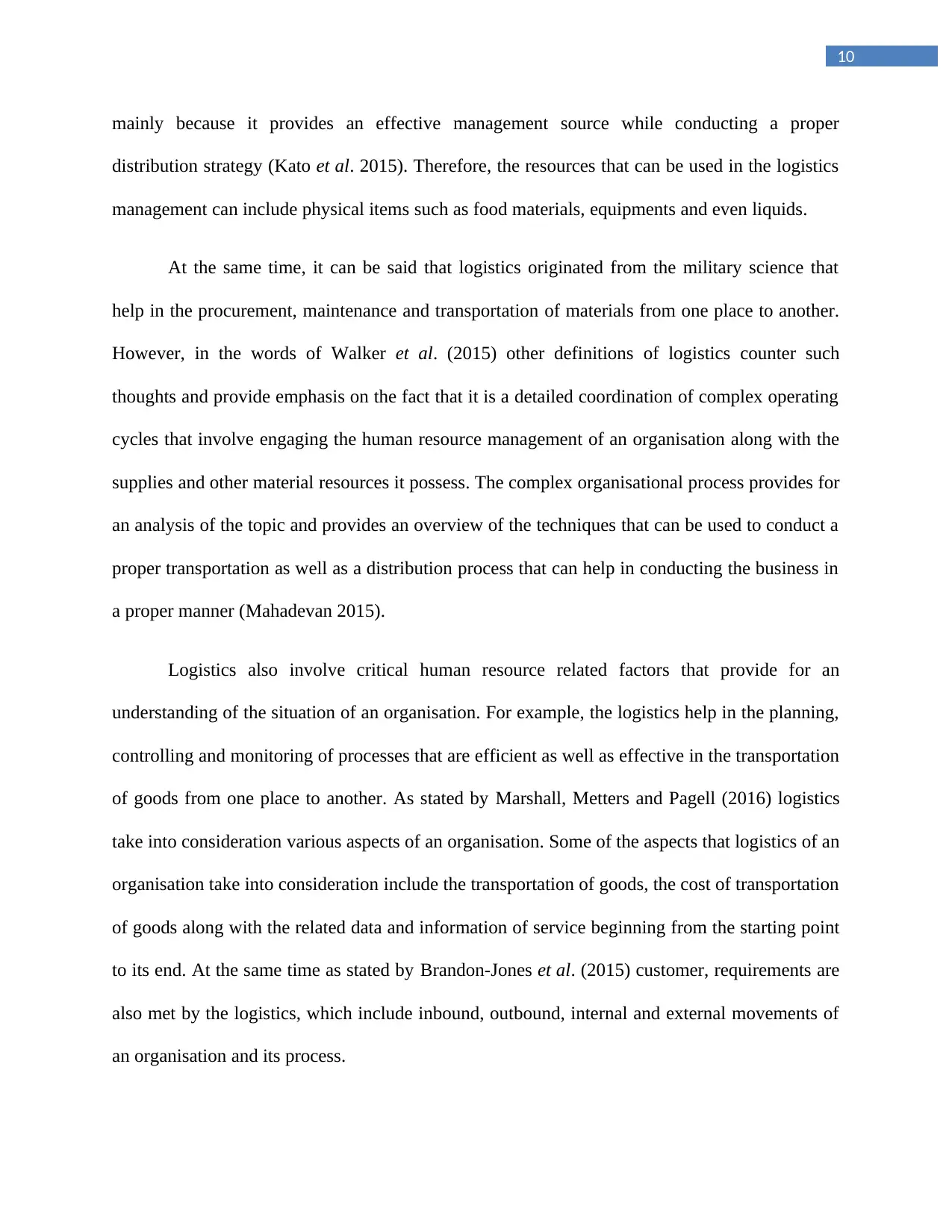
10
mainly because it provides an effective management source while conducting a proper
distribution strategy (Kato et al. 2015). Therefore, the resources that can be used in the logistics
management can include physical items such as food materials, equipments and even liquids.
At the same time, it can be said that logistics originated from the military science that
help in the procurement, maintenance and transportation of materials from one place to another.
However, in the words of Walker et al. (2015) other definitions of logistics counter such
thoughts and provide emphasis on the fact that it is a detailed coordination of complex operating
cycles that involve engaging the human resource management of an organisation along with the
supplies and other material resources it possess. The complex organisational process provides for
an analysis of the topic and provides an overview of the techniques that can be used to conduct a
proper transportation as well as a distribution process that can help in conducting the business in
a proper manner (Mahadevan 2015).
Logistics also involve critical human resource related factors that provide for an
understanding of the situation of an organisation. For example, the logistics help in the planning,
controlling and monitoring of processes that are efficient as well as effective in the transportation
of goods from one place to another. As stated by Marshall, Metters and Pagell (2016) logistics
take into consideration various aspects of an organisation. Some of the aspects that logistics of an
organisation take into consideration include the transportation of goods, the cost of transportation
of goods along with the related data and information of service beginning from the starting point
to its end. At the same time as stated by Brandon-Jones et al. (2015) customer, requirements are
also met by the logistics, which include inbound, outbound, internal and external movements of
an organisation and its process.
mainly because it provides an effective management source while conducting a proper
distribution strategy (Kato et al. 2015). Therefore, the resources that can be used in the logistics
management can include physical items such as food materials, equipments and even liquids.
At the same time, it can be said that logistics originated from the military science that
help in the procurement, maintenance and transportation of materials from one place to another.
However, in the words of Walker et al. (2015) other definitions of logistics counter such
thoughts and provide emphasis on the fact that it is a detailed coordination of complex operating
cycles that involve engaging the human resource management of an organisation along with the
supplies and other material resources it possess. The complex organisational process provides for
an analysis of the topic and provides an overview of the techniques that can be used to conduct a
proper transportation as well as a distribution process that can help in conducting the business in
a proper manner (Mahadevan 2015).
Logistics also involve critical human resource related factors that provide for an
understanding of the situation of an organisation. For example, the logistics help in the planning,
controlling and monitoring of processes that are efficient as well as effective in the transportation
of goods from one place to another. As stated by Marshall, Metters and Pagell (2016) logistics
take into consideration various aspects of an organisation. Some of the aspects that logistics of an
organisation take into consideration include the transportation of goods, the cost of transportation
of goods along with the related data and information of service beginning from the starting point
to its end. At the same time as stated by Brandon-Jones et al. (2015) customer, requirements are
also met by the logistics, which include inbound, outbound, internal and external movements of
an organisation and its process.
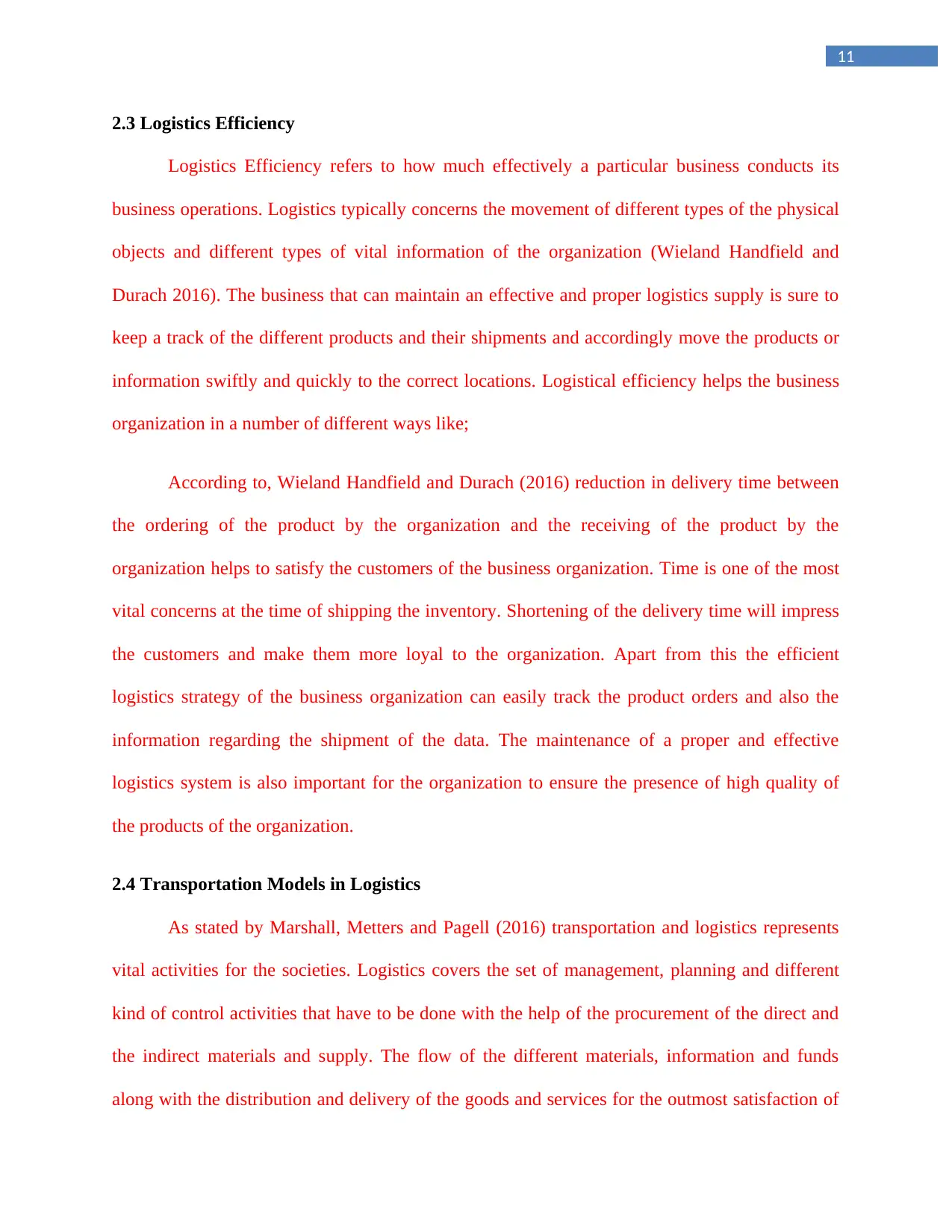
11
2.3 Logistics Efficiency
Logistics Efficiency refers to how much effectively a particular business conducts its
business operations. Logistics typically concerns the movement of different types of the physical
objects and different types of vital information of the organization (Wieland Handfield and
Durach 2016). The business that can maintain an effective and proper logistics supply is sure to
keep a track of the different products and their shipments and accordingly move the products or
information swiftly and quickly to the correct locations. Logistical efficiency helps the business
organization in a number of different ways like;
According to, Wieland Handfield and Durach (2016) reduction in delivery time between
the ordering of the product by the organization and the receiving of the product by the
organization helps to satisfy the customers of the business organization. Time is one of the most
vital concerns at the time of shipping the inventory. Shortening of the delivery time will impress
the customers and make them more loyal to the organization. Apart from this the efficient
logistics strategy of the business organization can easily track the product orders and also the
information regarding the shipment of the data. The maintenance of a proper and effective
logistics system is also important for the organization to ensure the presence of high quality of
the products of the organization.
2.4 Transportation Models in Logistics
As stated by Marshall, Metters and Pagell (2016) transportation and logistics represents
vital activities for the societies. Logistics covers the set of management, planning and different
kind of control activities that have to be done with the help of the procurement of the direct and
the indirect materials and supply. The flow of the different materials, information and funds
along with the distribution and delivery of the goods and services for the outmost satisfaction of
2.3 Logistics Efficiency
Logistics Efficiency refers to how much effectively a particular business conducts its
business operations. Logistics typically concerns the movement of different types of the physical
objects and different types of vital information of the organization (Wieland Handfield and
Durach 2016). The business that can maintain an effective and proper logistics supply is sure to
keep a track of the different products and their shipments and accordingly move the products or
information swiftly and quickly to the correct locations. Logistical efficiency helps the business
organization in a number of different ways like;
According to, Wieland Handfield and Durach (2016) reduction in delivery time between
the ordering of the product by the organization and the receiving of the product by the
organization helps to satisfy the customers of the business organization. Time is one of the most
vital concerns at the time of shipping the inventory. Shortening of the delivery time will impress
the customers and make them more loyal to the organization. Apart from this the efficient
logistics strategy of the business organization can easily track the product orders and also the
information regarding the shipment of the data. The maintenance of a proper and effective
logistics system is also important for the organization to ensure the presence of high quality of
the products of the organization.
2.4 Transportation Models in Logistics
As stated by Marshall, Metters and Pagell (2016) transportation and logistics represents
vital activities for the societies. Logistics covers the set of management, planning and different
kind of control activities that have to be done with the help of the procurement of the direct and
the indirect materials and supply. The flow of the different materials, information and funds
along with the distribution and delivery of the goods and services for the outmost satisfaction of
⊘ This is a preview!⊘
Do you want full access?
Subscribe today to unlock all pages.

Trusted by 1+ million students worldwide
1 out of 37
Related Documents
Your All-in-One AI-Powered Toolkit for Academic Success.
+13062052269
info@desklib.com
Available 24*7 on WhatsApp / Email
![[object Object]](/_next/static/media/star-bottom.7253800d.svg)
Unlock your academic potential
Copyright © 2020–2026 A2Z Services. All Rights Reserved. Developed and managed by ZUCOL.





